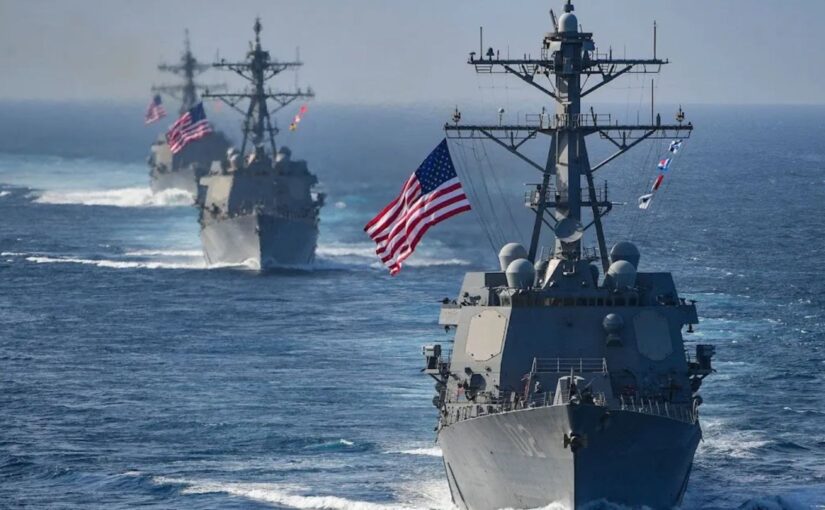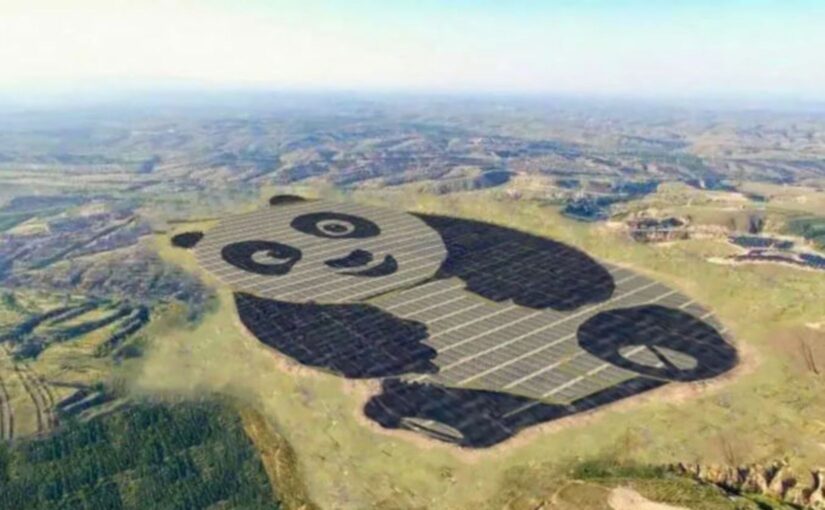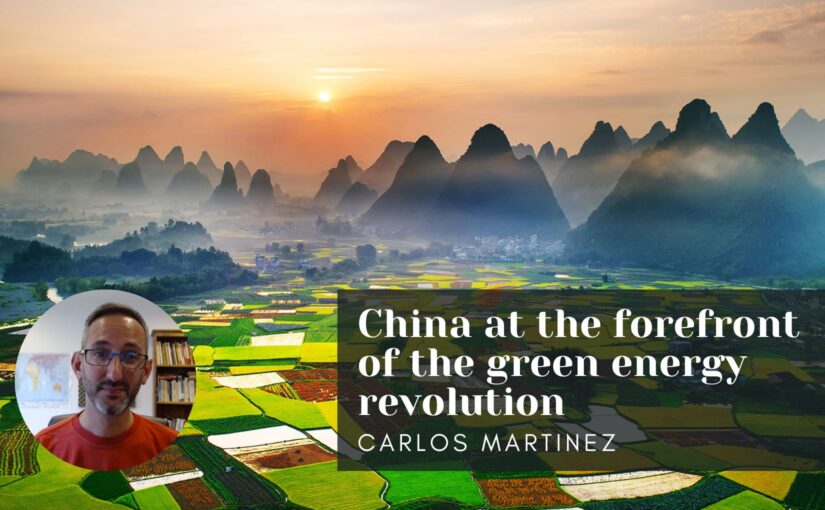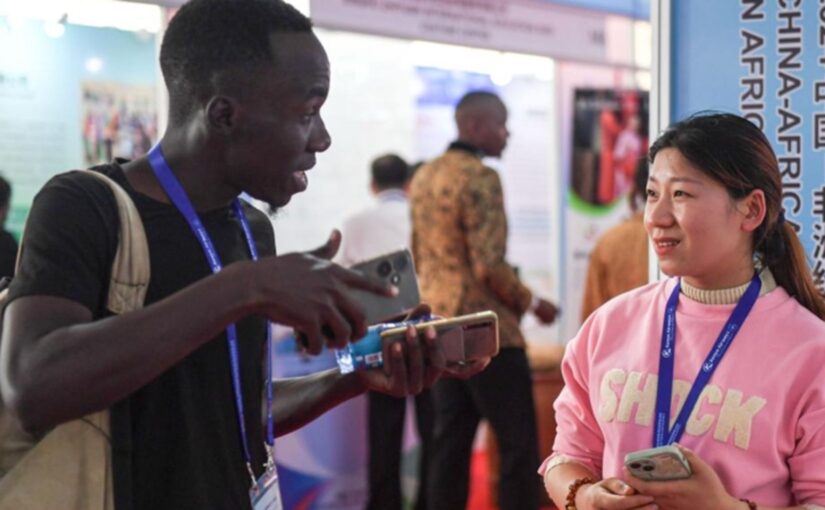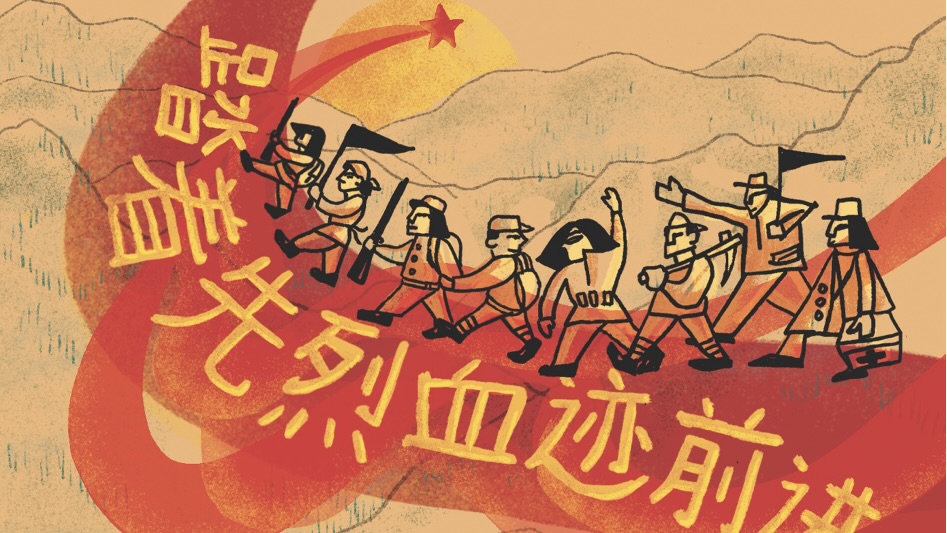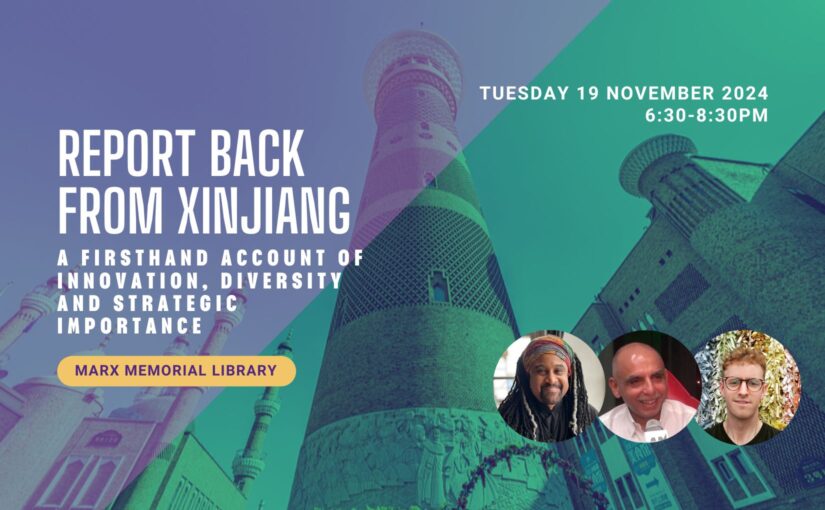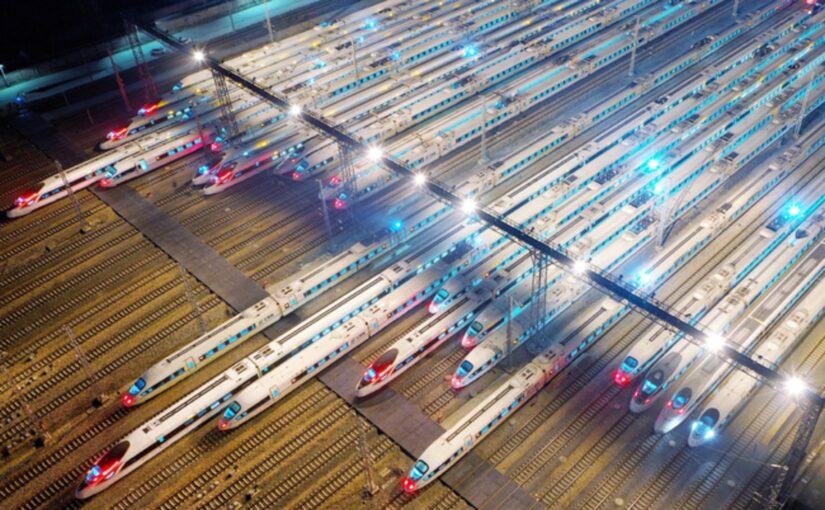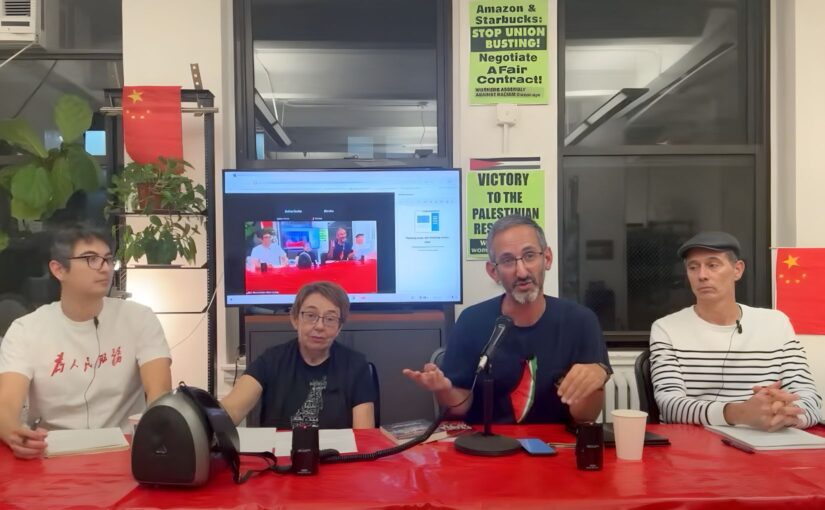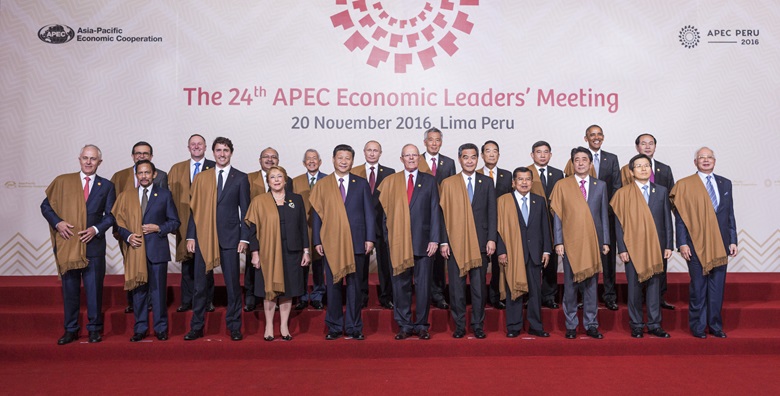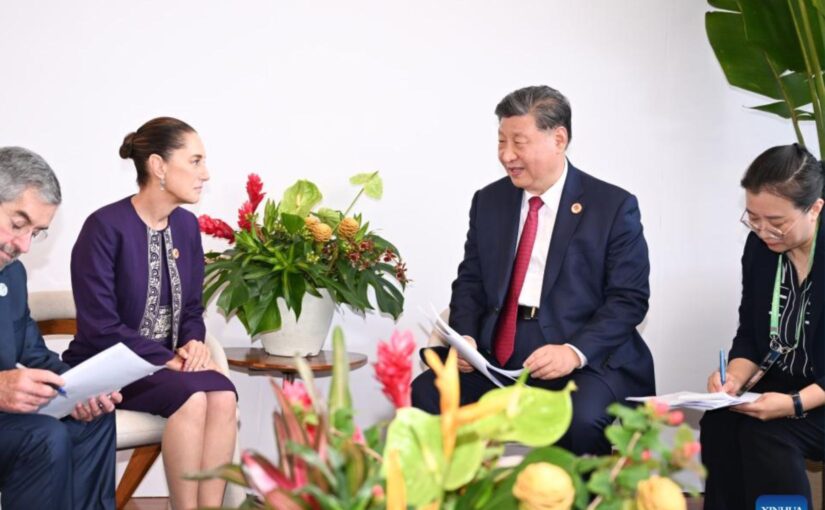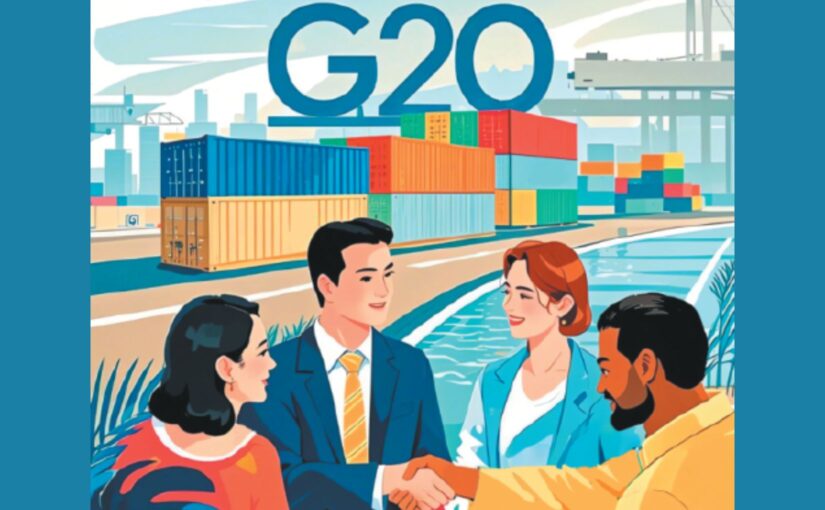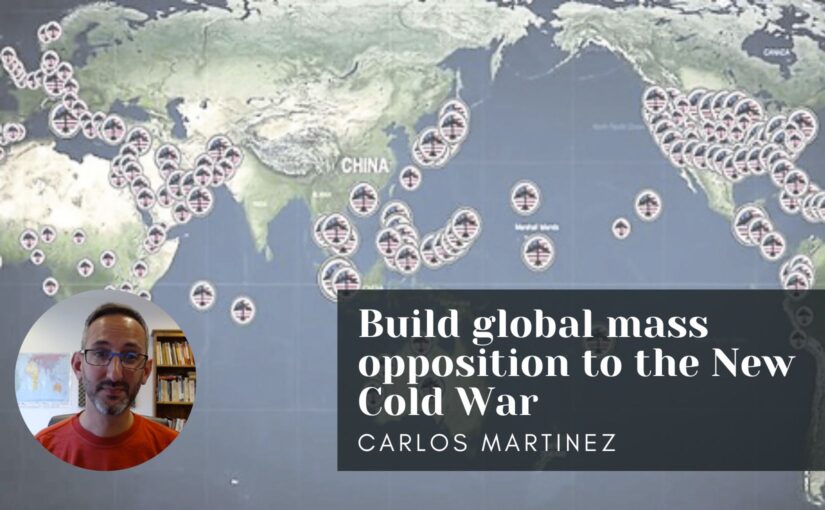 Build global mass opposition to the New Cold War
Build global mass opposition to the New Cold War
The following is the text of a speech given by Friends of Socialist China co-editor Carlos Martinez at an online meeting of the Scottish Trade Union Peace Network on 22 August 2024.
Carlos discusses the nature of China’s foreign policy, dealing with common criticisms such as that China seeks to “undermine democracy” in Taiwan, that it is an aggressive and expansionist power in the South China Sea, and that its nuclear arsenal poses a serious threat to world peace.
The speech goes on to analyse the theoretical basis and economic underpinnings of China’s foreign policy, observing that China’s rise “has never been based on dominating the land, labour, resources and markets of the rest of the world. It has never been driven by the expand-or-die logic of capital.”
Carlos concludes by detailing the expanding US-led campaign of containment and encirclement against China, and calling for “progressive and peace-loving people the world over to join hands in building global mass opposition to this insanity”.
Other speakers at the event included Fiona Edwards (No Cold War Britain) and Jonathon Shafi (Stop the War Scotland).
Many thanks for inviting me to join you.
I’m going to focus my remarks on China’s foreign policy, comparing that with the US and Britain’s foreign policy, and then discussing the dangers of this escalating New Cold War, which could all too easily end up as a hot war.
China aggressive?
China of course is framed in the Western media as an “aggressive” and “expansionist” power which is hell-bent on subverting the “rules-based international order”.
According to the NATO Heads of State summit in Washington last month, “China’s stated ambitions and coercive policies continue to challenge our interests, security and values”.
What’s the basis for this characterisation? I’m going to talk about some of common themes:
First, Taiwan. China is accused of undermining democracy in Taiwan and threatening imminent invasion.
The funny thing is that China’s position on the Taiwan question has not meaningfully changed in the last seven decades, and it’s entirely consistent with international law and numerous United Nations resolutions – not to mention the various joint agreements between the US and China.
Taiwan is a part of China. It was seized by Japan in 1895 and returned to Chinese control in 1945, at the end of World War 2, as agreed by Britain, the US, the Soviet Union and China at the Potsdam Conference.
In 1949, having lost in the Chinese Civil War, Chang Kai-shek and his people fled to Taiwan and set up a renegade administration, and the US positioned its Navy – the Seventh Fleet – in the Taiwan Strait to prevent the communist government from reuniting the country. But even then, Taiwan never claimed to be a separate country – the Kuomintang simply said that Taiwan was the real China and that the People’s Republic was the renegade. Indeed that idea is still part of Taiwan’s constitution.
So China’s very consistent position is that Taiwan is part of China. This position – the One China Principle – is accepted by more than 90 percent of the world’s countries, including the US and Britain. China has always said that it seeks peaceful reunification but that it reserves the right to use force in case of outside interference or a unilateral declaration of independence. Furthermore it makes the very reasonable point that the Taiwan issue is an internal matter for Chinese people on both sides of the Strait to resolve.
There is nothing particularly bellicose or unusual about such a position. Frankly, if you’ll excuse the slight provocation, China’s historic claim to Taiwan is far stronger than Britain’s historic claim to Scotland, but does anyone think Westminster would avoid the use of force if Scotland, backed and armed by Russia, say, were to unilaterally declare independence.
So nothing has changed with respect to China’s position on the Taiwan question. What’s changed is that the US and its allies, seeking to provoke conflict and undermine China, are increasing their support for separatist elements, are increasing their supply of weapons to the administration in Taipei, and are steadily rowing back on the One China Principle.
Biden has said multiple times that the US would intervene militarily if Beijing were to attempt to change the status quo by force – which goes directly against what was agreed by the US and China back in the 1970s when relations were re-established. It is essentially a way of signalling: we are building towards war against China, and Taiwan will likely be the flashpoint. And the way we plan to win public support for that war is by presenting it as a war to protect democracy in Taiwan.
Another popular accusation about China’s “aggression” is that it’s engaged in expansionism in the South China Sea, because it patrols its own waters, and because it has a number of complicated territorial disputes over control of an array of tiny uninhabited islands.
The details of the disputes are not particularly relevant for our purposes. These territorial disputes are inherited from previous generations and they’re not easy to resolve. For example, there are numerous disputes in relation to the Arctic Circle, between Canada, Denmark, Norway, Russia and the US. The disputes involving China receive relatively more attention because the US is attempting to leverage them to foment broader anti-China feeling in Southeast Asia and to present China in the most negative light possible.
Again, China hasn’t changed its position on these questions; there has simply been an escalation of anti-China propagandising by the West.
On the South China Sea, it’s worth mentioning that China’s definition of its borders was determined before 1949, before the founding of the People’s Republic. The nine-dash line defining China’s maritime borders was created by the Kuomintang government in 1947, and certainly didn’t cause any stir in Western capitals at the time. After all, China at that time was considered by the West as an important ally in the global war against communism.
The People’s Republic of China has not made a single new territorial claim. And although it patrols the South China Sea and works to protect its trade routes and to prevent any potential blockade being imposed by the US, it has never once impeded international trade.
So when the US carries out its so-called ‘freedom of navigation assertions’ in the South China Sea, it’s not because China is blocking navigation. China is not being aggressive; the US is being aggressive, and according itself the role of world policeman. The US has no jurisdiction in the South China Sea. Can anyone imagine what the US response would be if China carried out freedom of navigation assertions off the coast of California?
Then there’s the question of nuclear weapons. The media is full of alarmist reports about China’s expanding nuclear arsenal. But China has fewer than 500 nuclear warheads, compared to over 5,000 for the US.
China maintains a strictly defensive nuclear posture. Of all the nuclear powers, it is the only one to have a clear policy of no-first use, meaning that it will never use nuclear weapons other than in response to a nuclear attack.
It’s also the only nuclear power to guarantee that it will never use nuclear weapons against a non-nuclear country, meaning that it refuses to engage in the type of nuclear blackmail which the US specialises in.
China’s foreign policy
China has peaceful development literally written into its constitution. It maintains a nuclear deterrent because if it didn’t, the US realistically wouldn’t hesitate to wage war against it.
As I said, the US has over 5,000 nuclear warheads, does not have a policy of no-first use, is the only country to ever use nuclear weapons, has threatened to use them numerous times – including against China, during the Korean War – and has a record of waging wars around the world in pursuit of its own economic and geostrategic interests.
China’s whole outlook is very different. Hugo Chávez put it well:
“China is large but it’s not an empire. China doesn’t trample on anyone, it hasn’t invaded anyone, it doesn’t go around dropping bombs on anyone.”
Yes, China has become a major power. It’s the world’s second largest economy. Its people live far better than they used to. It’s a science and technology powerhouse. It’s successfully pursuing modernisation.
That process of modernisation was a violent one in the West. It relied on colonialism, slavery, war, plunder, domination. The same processes that made Europe and North America rich, made Africa, Asia, Latin America, the Caribbean and the Pacific poor.
And having won this advantage, the West – these days led by the US – seeks to maintain it through force. That’s why the US maintains over 800 overseas military bases. That’s why it maintains tens of thousands of troops – and nuclear weapons – in Japan, South Korea, Guam and Okinawa. That’s why NATO went to war against Iraq, Afghanistan, Libya and Yugoslavia. That’s why the US waged genocidal wars against Korea and Vietnam. That’s why the US and its allies continue to wage proxy wars even today in Ukraine, in Yemen, in Syria.
There’s a tendency to see China’s rise and assume that it will follow the same aggressive trajectory as Europe, Japan and the United States. And yet China’s rise has been remarkably peaceful. It hasn’t been at war in over 40 years.
China doesn’t have a global infrastructure of hegemony – foreign bases, troops and weapons stationed in other countries. China has one overseas military base, in Djibouti, with the sole purpose of protecting its trade ships from piracy.
By the time Britain or the US were at China’s current stage of development, both were engaged in endless wars of conquest and domination. Both built relationships of outright subjugation with the countries of the Global South.
China follows an entirely different approach to international relations, with the reason that its economic rise has followed a fundamentally different logic. It has never been based on dominating the land, labour, resources and markets of the rest of the world. It has never been driven by the expand-or-die logic of capital.
China is on the cusp of being a high-income country, but China doesn’t wage wars of domination. China doesn’t interfere in other countries’ internal affairs. China doesn’t threaten other countries or engage in destabilisation. China doesn’t impose unilateral sanctions or economic coercion.
Much is made of China’s economic power, and yet its loans and investment throughout Africa, Latin America, the Caribbean and elsewhere are generally speaking welcome, because they come with a low rate of interest, there’s no conditions of austerity (unlike the IMF’s notorious structural adjustment programs), and because they’re used to fund crucial infrastructure projects that are allowing countries to break out of underdevelopment after centuries of colonial and neocolonial exploitation.
For example, with Chinese finance and support, Ethiopia opened the first metro system in sub-Saharan Africa a few years ago.
With Chinese finance and support, Bolivia launched a telecoms satellite that provides connectivity to the whole country – the poorest country in South America.
China built the new African Union headquarters in Addis Ababa, a gift from the Chinese government.
The same with the new headquarters of the Africa Centres for Disease Control and Prevention.
Then contrast China and the US when it comes to the Middle East. The US and its allies have fought devastating – genocidal – wars in order to control the natural resources of that region.
In Iraq there’s a popular saying: “the US bombs, while China builds”. In no area of life is that more true than with schools. The US bombed literally hundreds of schools during the Iraq War. China is currently building literally thousands of schools in Iraq.
In Ukraine, the US did everything it could to bring about this conflict, and now it’s doing everything it can to keep the conflict going – to “fight Russia to the last Ukrainian”. China, in coordination with Brazil, the African Union and others, is leading efforts to find a solution to the crisis based on dialogue and negotiation.
What about the tragic situation in Gaza, where over 40,000 people – and in all likelihood at least twice that – have been murdered by a brutal apartheid regime, using weapons in large part supplied by the US and Britain. The Western powers could have stopped this genocide in the space of a day if they’d cut off the supply of weapons to Israel, if they’d imposed sanctions on Israel.
China is increasingly recognised as the credible peace broker in relation to Palestine. It’s been a loud and consistent voice in the international community condemning Israel’s onslaught and demanding an unconditional ceasefire. It insists on the restoration of the fundamental national rights of the Palestinian people, and, very significantly, recently mediated an agreement between 14 Palestinian resistance movements, with the rationale that Palestinians need the maximum level of unity if they’re going to win their rights.
So this idea that China is an aggressive power, or that one can put an equals sign between Chinese and US foreign policy, simply has no reasonable basis.
Encirclement
Meanwhile, we’re seeing the US and its allies pushing a New Cold War, along with an escalating campaign of containment and encirclement of China.
This includes economic, diplomatic and propaganda aspects, including sanctions, a trade war, the chip war and other attempts to prevent China from modernising, tariffs, and so on.
But it also includes a significant military component: the increasing presence of NATO warships in the South China Sea and the Taiwan Strait; the creation of AUKUS, the nuclear pact between Britain, the US and Australia, with a clear objective of confronting China; the defence agreements between the US, Japan and South Korea; the installation of new US military bases in the Philippines; encouraging the remilitarisation of Japan; increasing the transfer of weapons to Taiwan; and deploying the Terminal High Altitude Area Defence system in South Korea and Guam.
‘Cold Wars’ sound relatively benign, relatively innocuous, but they can turn hot, and the US and its allies are actively putting the pieces in place for this New Cold War to turn hot. Meanwhile the original Cold War wasn’t particularly cold in Korea, Vietnam, Cambodia, Laos, Indonesia, Angola, Brazil, Chile, Nicaragua, and elsewhere. Many millions of people lost their lives, and whole countries were destroyed, within this framework of Cold War.
Fight for peace
The vast majority of the people of the world don’t want war, hot or cold. What we need is global cooperation.
Humanity faces serious existential threats in the form of climate breakdown, pandemics, antimicrobial resistance, and the possibility of nuclear war.
To face up to these threats, we need to work collectively and within a framework of multipolarity, the UN Charter, and international law. The US’s insistence – and unfortunately this a bipartisan phenomenon, please don’t think Kamala Harris is going to save us – on maintaining its hegemony, on pursuing a Project for a New American Century, is a serious impediment to securing a safe future for humanity.
As such, it’s crucial and urgent that that progressive and peace-loving people the world over join hands in building global mass opposition to this insanity.
https://socialistchina.org/2024/08/28/b ... -cold-war/
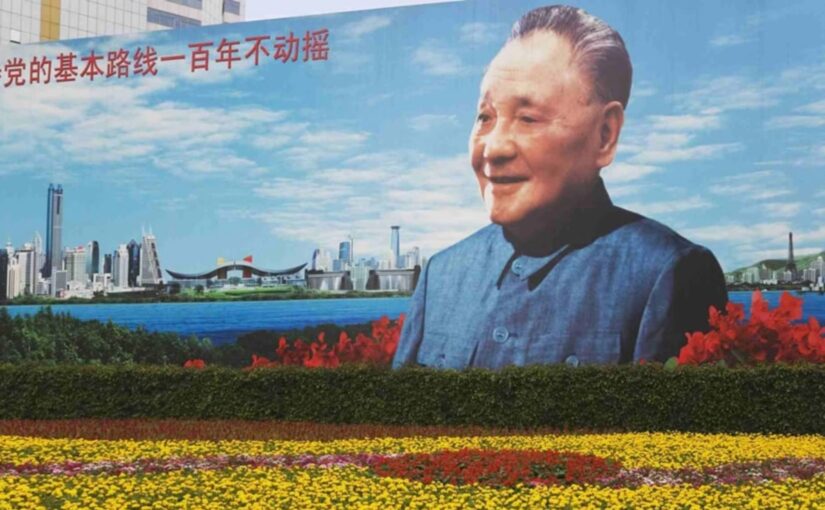 Xi: Deng Xiaoping was a great Marxist, strategist, diplomat, and long-tested communist fighter
Xi: Deng Xiaoping was a great Marxist, strategist, diplomat, and long-tested communist fighter
The Communist Party of China (CPC) Central Committee held a symposium on the morning of August 22 at Beijing’s Great Hall of the People to commemorate the 120th birth anniversary of Comrade Deng Xiaoping. Chinese President Xi Jinping made an important speech there.
Xi emphasised that Comrade Deng Xiaoping is recognised by the entire Party, the military, and the people of all ethnic groups across the country as an outstanding leader with high prestige, a great Marxist, a great proletarian revolutionary, statesman, military strategist, diplomat, and a long-tested communist fighter. Deng was the core of the second generation of the Party’s central collective leadership, the chief architect of China’s socialist reform, opening up and modernisation, the trailblazer of socialism with Chinese characteristics, and the principal creator of Deng Xiaoping Theory. He made significant contributions to world peace and development as a great internationalist. And he made outstanding contributions to the Party, the people, the country, the nation, and the world.
Xi further noted that Comrade Deng Xiaoping’s life was a glorious, fighting and extraordinary one. Deng made outstanding contributions to the Party-led causes of national independence and people’s liberation, and to the founding of the People’s Republic of China. He carried out highly effective work in establishing the socialist system and advancing socialist construction. After the end of the Cultural Revolution, as the core of the second generation of the Party’s central collective leadership, Deng led the Party and the people in achieving a historic shift, drove a new leap forward in adapting Marxism to the Chinese context, broke new ground in socialist modernisation, set a right path for realising China’s complete reunification, firmly upheld the splendid banner of socialism, and successfully initiated socialism with Chinese characteristics.
Xi emphasised that Deng’s historical achievements are comprehensive and groundbreaking, with profound and lasting impact on both China and the world. Deng’s lifelong journey of struggle fully demonstrated his unwavering commitment to the lofty ideals of communism and the belief in socialism with Chinese characteristics, his deep love for the people, his adherence to the principle of seeking truth from facts, his political courage in continuous innovation, his far-sighted strategic thinking, and his broad-mindedness and selflessness.
Referring to Deng’s early life, Xi said that in the face of the profound national disasters of feudal rule and corruption, the invasion of Western powers, and the starvation and cold of the people, the young Deng Xiaoping actively participated in the mass struggle in his hometown, and later went to Europe to work and study, firmly chose Marxism, and joined the Communist Party of China.
An important section of Xi’s speech dealt with the events of 1989:
“Comrade Deng Xiaoping firmly defended the glorious banner of socialism. In the process of reform and opening up, he always took a clear-cut stand against bourgeois liberalisation. Against the backdrop of the collapse of the Soviet Union and the drastic changes in Eastern Europe, a serious political turmoil occurred in China at the turn of the spring and summer of 1989. At the critical moment, Comrade Deng Xiaoping led the party and the people to take a clear-cut stand against turmoil and resolutely defend the socialist state power, so that the party and the country withstood the severe test of dangerous winds and waves. After that, he profoundly summed up the lessons in the process of reform and opening up, and stressed the need to concentrate on party building, strengthen ideological and political work and education in fine traditions, improve the party’s leadership level and ruling ability, and ensure the stability of the red country. He admonished the people with a deafening voice: ‘Socialism in China cannot be changed. China will certainly follow the socialist road it has chosen to the end. No one can crush us.'”
Xi continued: “Comrade Deng Xiaoping’s historical exploits are all-round and groundbreaking, and their impact on China and the world is profound and long-term. In the course of his life’s struggle, he fully demonstrated his lofty character of incomparably firm belief in the lofty ideals of communism and socialism with Chinese characteristics, his great feelings of incomparable love for the people, the theoretical quality of always seeking truth from facts, the political courage to constantly blaze new trails, his far-sighted strategic thinking, and his frank and selfless broad-mindedness. His great historical exploits will always be remembered. His noble revolutionary demeanour will always be admired by us!”
He added: “Since the 18th National Congress of the Communist Party of China, everything we have done is to fulfil the original mission of the party, to complete the unfinished business of Mao Zedong, Deng Xiaoping and other revolutionaries of the older generation, and to uphold and develop socialism with Chinese characteristics under the conditions of the new era. The times are constantly advancing, the cause is constantly developing, and theoretical and practical innovation cannot be stopped for a moment. Comrade Deng Xiaoping said: ‘China should have something new every year, and something new every day.’ It is the solemn historical responsibility of the contemporary Chinese Communists to constantly open up a new realm of Sinicisation and modernisation of Marxism. In the new era and new journey, we must adhere to integrity and innovation, never forget our ancestors, always take the right path, be good at breaking new paths, make the tree of theory evergreen and the tree of our cause evergreen, and constantly comfort the older generation of revolutionaries with new deeds and new achievements.”
Towards the end of his speech, he stated: “At this moment, I am reminded of two remarks made by Comrade Deng Xiaoping: First, ‘by the next century and 50 years, if we basically achieve modernisation, we can further assert the success of socialism.’ The second is that ‘by the middle of the next century, it will be able to approach the level of the developed countries in the world, and that will be the big change. At that time, the weight and role of Socialist China will be different, and we will be able to make greater contributions to humanity.'”
Deng’s remark here about making greater contributions to humanity is derived from Mao Zedong’s 1956 article commemorating the 90th birthday of Dr. Sun Yat-Sen:
“Things are always progressing. It is only forty-five years since the Revolution of 1911, but the face of China has entirely changed. In another forty-five years, that is, by the year 2001, at the beginning of the 21st century, China will have undergone an even greater change. It will have become a powerful industrial socialist country. And that is as it should be. China is a land with an area of 9,600,000 square kilometres and a population of 600 million, and it ought to make a greater contribution to humanity. But for a long time in the past its contribution was far too small. For this we are regretful.”
We reproduce below a report on the symposium that was originally published by the Xinhua News Agency. We also carry the full text of the important speech of Xi Jinping. This was issued by Xinhua and published in Chinese in People’s Daily. It has been machine translated and lightly edited by us.
Xi urges advancing socialism with Chinese characteristics at symposium held to mark Deng Xiaoping’s 120th birth anniversary
The Communist Party of China (CPC) Central Committee held a symposium on the morning of Aug. 22 at the Great Hall of the People to commemorate the 120th birth anniversary of Comrade Deng Xiaoping. Chinese President Xi Jinping, also general secretary of the CPC Central Committee and chairman of the Central Military Commission (CMC), delivered an important speech. Xi emphasized that Comrade Deng Xiaoping is recognized by the entire Party, the military, and the people of all ethnic groups across the country as an outstanding leader with high prestige, a great Marxist, a great proletarian revolutionary, statesman, military strategist, diplomat, and a long-tested communist fighter. Deng was the core of the second generation of the Party’s central collective leadership, the chief architect of China’s socialist reform, opening up and modernization, the trailblazer of socialism with Chinese characteristics, and the principal creator of Deng Xiaoping Theory. He made significant contributions to world peace and development as a great internationalist. Deng made outstanding contributions to the Party, the people, the country, the nation, and the world. Deng’s achievements have been immortalized in history and will always inspire future generations.
The symposium was attended by members of the Standing Committee of the Political Bureau of the CPC Central Committee Zhao Leji, Wang Huning, Ding Xuexiang, and Li Xi, as well as Vice President Han Zheng. The symposium was presided over by Cai Qi, also a member of the Standing Committee of the Political Bureau of the CPC Central Committee.
In his speech, Xi noted that Comrade Deng Xiaoping’s life was a glorious, fighting and extraordinary one. Deng made outstanding contributions to the Party-led causes of national independence and people’s liberation, and to the founding of the People’s Republic of China. He carried out highly effective work in establishing the socialist system and advancing socialist construction. After the end of the Cultural Revolution, as the core of the second generation of the Party’s central collective leadership, Deng led the Party and the people in achieving a historic shift, drove a new leap forward in adapting Marxism to the Chinese context, broke new ground in socialist modernization, set a right path for realizing China’s complete reunification, firmly upheld the splendid banner of socialism, and successfully initiated socialism with Chinese characteristics.
Xi emphasized that Deng’s historical achievements are comprehensive and groundbreaking, with profound and lasting impact on both China and the world. Deng’s lifelong journey of struggle fully demonstrated his unwavering commitment to the lofty ideals of communism and the belief in socialism with Chinese characteristics, his deep love for the people, his adherence to the principle of seeking truth from facts, his political courage in continuous innovation, his far-sighted strategic thinking, and his broad-mindedness and selflessness. We will forever remember his great historical achievements and forever revere his noble revolutionary conduct.
Xi highlighted that the most important intellectual legacy left to us by Comrade Deng Xiaoping is Deng Xiaoping Theory, which he primarily developed. Deng Xiaoping Theory represents a significant milestone in the process of adapting Marxism to the Chinese context and the needs of the times. As we embark on a new journey of the new era, we must continue to thoroughly study and apply Deng Xiaoping Theory, fully and accurately grasp its scientific essence and core principles. This involves both adhering to the major conclusions, fundamental viewpoints, and correct propositions Deng Xiaoping made based on his understanding of the laws of socialism, and correctly grasping the theory’s core and essence in light of changing circumstances to solve contemporary problems. This ensures our unwavering commitment to truth and our consistent application of theory in practice.
We must always uphold Marxism-Leninism, Mao Zedong Thought, Deng Xiaoping Theory, the Theory of Three Represents, and the Scientific Outlook on Development, and fully implement the Thought on Socialism with Chinese Characteristics for a New Era. It is essential to steadfastly maintain Marxism as our guiding principle and China’s fine traditional culture as our foundation, and learn from and absorb the outstanding achievements of human civilization. By continuously exploring truth and addressing the practical issues in advancing Chinese modernization, we can profoundly answer the questions posed by China, the world, the people, and the times. This will further advance the adaptation of Marxism to the Chinese context and the needs of the times, allowing the Marxism of contemporary China and of the 21st century to shine with even greater brilliance.
Xi emphasized that the best way to honor Comrade Deng Xiaoping is to continue advancing the cause of socialism with Chinese characteristics that he initiated. We must focus on the central task of building a great country and national rejuvenation on all fronts through a Chinese path to modernization, carrying forward the legacy and striving for progress. It is essential to uphold fundamental principles and break new ground, further deepen reforms comprehensively, and continuously provide robust momentum and institutional guarantees for Chinese modernization.
We must prioritize high-quality development as the primary task, fully, accurately, and comprehensively implement the new development philosophy, and advance the coordinated implementation of the Five-Sphere Integrated Plan and the Four-Pronged Comprehensive Strategy. We must move faster to build a modernized economy, work toward greater self-reliance in the science and technology sector, vigorously develop advanced socialist culture, and boost material and cultural-ethical advancement and harmony between humanity and nature.
We must adhere to the principle of putting people first, develop whole-process people’s democracy, build a higher level of the rule of law in China, and ensure that development is accompanied by the safeguarding and improvement of people’s livelihoods, thus making substantial progress toward common prosperity for all. We should also promote high-standard opening up to the outside world, steadily expand institutional openness, boost high-quality development of the Belt and Road Initiative, and balance openness with security to safeguard national sovereignty, security, and development interests.
We must unswervingly advance the full and rigorous self-governance of the Party, improve the system for Party self-discipline, and resolutely win the tough and protracted battle against corruption. This ensures that the Party will never change its nature, its conviction, or its character, and it is always the firm core leadership guiding the cause of socialism with Chinese characteristics.
Xi noted that realizing China’s complete reunification has long been the aspiration of Mao Zedong, Deng Xiaoping and other members of the older generation of revolutionaries, a common will of Chinese people both at home and overseas, and an unstoppable historical trend. We should fully, faithfully, and resolutely implement the policy of “one country, two systems,” under which the people of Hong Kong administer Hong Kong and the people of Macao administer Macao, both with a high degree of autonomy. We should support and promote the further integration of Hong Kong and Macao into the country’s overall development, enabling them to achieve better development. We should resolutely implement the Party’s overall policy framework for resolving the Taiwan question in the new era, adhere to the one-China principle and the 1992 Consensus, promote the peaceful development of cross-Strait relations, and oppose “Taiwan independence” to safeguard China’s sovereignty and territorial integrity, Xi said.
Xi stressed that China has always been a staunch force for world peace. We should always uphold peace, development, cooperation and mutual benefit, advance the building of a human community with a shared future, and champion humanity’s shared values. We should implement the Global Development Initiative, the Global Security Initiative and the Global Civilization Initiative, take an active role in the reform and development of the global governance system, and create new opportunities for the world with new progress in advancing Chinese modernization, Xi said.
While presiding over the meeting, Cai Qi said that General Secretary Xi’s important speech profoundly reviewed the glorious, fighting, and great life of Comrade Deng Xiaoping. Xi’s speech lauded the great historical achievements of Deng in leading the CPC and the Chinese people to usher in the new period of reform and opening up, and socialist modernization, in initiating socialism with Chinese characteristics, and in establishing Deng Xiaoping Theory. Xi’s speech emphasized the need to faithfully study and apply Deng Xiaoping Theory, to learn from Deng’s noble revolutionary demeanor, and to carry forward the cause of socialism with Chinese characteristics that Deng initiated. The speech is insightful, profound, and of political, ideological and theoretical significance. It is of great importance to guiding the Party to uphold and develop socialism with Chinese characteristics under new conditions in the new era. We should earnestly study, grasp, and thoroughly implement Xi’s speech, and jointly strive to build a strong country and realize national rejuvenation on all fronts through Chinese modernization.
At the symposium, Qu Qingshan, president of the Institute of Party History and Literature of the CPC Central Committee, Miao Hua, a member of the CMC and director of the Political Work Department of the CMC, and Wang Xiaohui, secretary of the Sichuan Provincial Committee of the CPC, delivered speeches in turn.
Members of the Political Bureau of the CPC Central Committee in Beijing, members of the Secretariat of the CPC Central Committee, as well as relevant leading officials from the Standing Committee of the National People’s Congress, the State Council, the National Committee of the Chinese People’s Political Consultative Conference, and the CMC attended the symposium.
Also in attendance were leading officials from relevant central authorities, the Beijing municipal government and the Sichuan Provincial Committee of the CPC, representatives of central committees of non-CPC parties, the All-China Federation of Industry and Commerce, and personages without party affiliation, relatives of Deng Xiaoping, his former staff and representatives from his hometown, and participants of a national academic seminar to commemorate the 120th birth anniversary of Deng Xiaoping.
Speech at a forum to commemorate the 120th anniversary of Comrade Deng Xiaoping’s birth
Comrades and friends,
Today, we are solemnly gathered here to commemorate the 120th anniversary of the birth of our beloved Comrade Deng Xiaoping.
Comrade Deng Xiaoping was an outstanding leader of high prestige recognised by the whole party, the whole army, and the people of all nationalities in the country, a great Marxist, a great proletarian revolutionary, statesman, military strategist, and diplomat, a time-tested communist fighter, the core of the party’s second-generation central leadership collective, the chief architect of China’s socialist reform, opening up, and modernisation, the pioneer of the road of socialism with Chinese characteristics, the main founder of Deng Xiaoping Theory, and a great internationalist who made major contributions to world peace and development.
Comrade Deng Xiaoping’s life was a glorious life, a life of fighting, and a great life, and he made outstanding contributions to the party, the people, the country, the nation, and the world.
Comrade Deng Xiaoping was born in Guang’an County, Sichuan Province. In the face of the profound national disasters of feudal rule and corruption, the invasion of Western powers, and the starvation and cold of the people, the young Deng Xiaoping actively participated in the mass struggle in his hometown, and later went to Europe to work and study, firmly chose Marxism, and joined the Communist Party of China.
In 1927, Comrade Deng Xiaoping returned from the Soviet Union to participate in the struggle for the new democratic revolution led by the party. He successively led the launch of the Baise Uprising and the Longzhou Uprising, established the Zuojiang Revolutionary Base Area, participated in the relevant work of the Central Revolutionary Base Area, and personally experienced the Long March and the Zunyi Conference. During the War of Resistance Against Japanese Aggression and the War of Liberation, together with Liu Bocheng, Chen Yi and other comrades, he successively opened up the Shanxi, Hebei, Shandong, and Henan anti-Japanese base areas, led his troops to leap thousands of miles into the Dabie Mountains, organised and implemented the Huaihai Campaign and the River Crossing Campaign, and made outstanding contributions to the cause of national independence and people’s liberation under the leadership of the party and the establishment of New China.
At the beginning of the founding of the People’s Republic of China, Comrade Deng Xiaoping served as the principal responsible person of the Southwest Bureau of the CPC Central Committee. Together with Comrades Liu Bocheng and He Long, he led his troops to liberate the great southwest, led the building of political power, participated in the work of leading the march into Tibet and the peaceful liberation of Tibet, and brought about earth-shaking changes in the southwest region.
After July 1952, Comrade Deng Xiaoping served as Secretary General of the CPC Central Committee, member of the Political Bureau of the CPC Central Committee, and Vice Premier of the People’s Republic of China. At the First Plenary Session of the Eighth CPC Central Committee in 1956, he was elected as a member of the Standing Committee of the Political Bureau of the CPC Central Committee and General Secretary of the CPC Central Committee, becoming an important member of the first generation of the party’s central leadership collective with Comrade Mao Zedong as the core. In the following 10 years, he was responsible for a large part of the daily work of the Party Central Committee, put forward many correct propositions and carried out fruitful work for the establishment of the socialist system and socialist construction, and for the strengthening and improvement of Party building. Soon after the Cultural Revolution began, he was wrongly criticised and struggled against, and was stripped of all his positions. In 1973, he resumed his work. In 1975, he began to preside over the daily work of the party, the state, and the army, and, in order to reverse the serious chaos caused by the ‘Cultural Revolution’, he carried out a comprehensive rectification in a big way, and waged a-for-tat struggle against the ‘Gang of Four’. Soon, he was wrongly removed and criticised again, but he remained unswervingly committed to communism and socialism.
After the end of the ‘Cultural Revolution’, Comrade Deng Xiaoping, as the core of the party’s second-generation central leadership collective, led the party and the people to successfully usher in a new period of China’s reform, opening up, and socialist modernisation, and to create socialism with Chinese characteristics.
Comrade Deng Xiaoping led a great historical turning point. Shortly after the end of the ‘Cultural Revolution’, Comrade Deng Xiaoping resumed his old post. At the important historical juncture when the party and the country were facing the question of where to go, he stressed that seeking truth from facts, the mass line, and independence are the quintessence of Mao Zedong Thought, took a clear-cut stand against the erroneous viewpoint of ‘two whatevers’, led and supported the discussion on the issue of the criterion of truth, promoted the rectification of chaos in all quarters, and called on the whole party and the people of the whole country to unite and look forward. Under his guidance, the Third Plenary Session of the 11th CPC Central Committee re-established the ideological line of emancipating the mind and seeking truth from facts, stopped using the erroneous formulation of ‘taking class struggle as the key link’, and made the historic decision to shift the focus of the work of the party and the state to economic construction and to carry out reform and opening up, thus bringing about a great turning point of far-reaching significance in the party’s history.
Comrade Deng Xiaoping promoted a new leap forward in the Sinicisation of Marxism. He led the whole party to profoundly sum up the positive and negative experiences since the founding of New China, constantly promote theoretical innovations, and put forward many major ideas of pioneering significance. Under his auspices, the Sixth Plenary Session of the 11th CPC Central Committee adopted the ‘Resolution on Several Issues in the Party’s History Since the Founding of the People’s Republic of China’, which correctly appraised Comrade Mao Zedong’s historical status and the scientific system of Mao Zedong Thought, completely negated the erroneous practice and theory of the ‘Cultural Revolution’, stressed the need to uphold and develop Mao Zedong Thought, and set the correct direction for the development of the party and the country. At the 12th National Congress of the Communist Party of China, he clearly proposed to “take our own road and build socialism with Chinese characteristics.” According to Comrade Deng Xiaoping’s thought, the 13th National Congress of the Communist Party of China systematically expounded the theory of the primary stage of socialism and completely summarised the party’s basic line in the primary stage of socialism. The 14th National Congress of the Communist Party of China put forward Comrade Deng Xiaoping’s theory on building socialism with Chinese characteristics. The 15th CPC National Congress established Deng Xiaoping Theory as the party’s guiding ideology. Deng Xiaoping Theory profoundly answered the fundamental question of what socialism is and how to build it, profoundly revealed the essence of socialism, provided a guide for action for China’s reform, opening up, and socialist modernisation, and is the foundation of the theoretical system of socialism with Chinese characteristics.
Comrade Deng Xiaoping led the party and the people to open up a new situation in socialist modernisation. He clearly put forward the ideas of “building a moderately prosperous society” and “embarking on a Chinese-style road to modernisation” and guided our party in formulating a “three-step” development strategy for modernisation. He led our party to carry out structural reforms in all aspects in a timely and resolute manner, and bravely opened the door to opening up to the outside world. He pointed out that science and technology are the primary productive forces, advocated respect for knowledge and talent, and promoted the development of education, science, and culture. He attached importance to the building of democracy and the legal system and promoted the reform of the party and state leadership system and institutional reform. He stressed the need to build the people’s army into a powerful, modernised, and regularised revolutionary army and take the road of elite troops with Chinese characteristics. He clearly pointed out that peace and development are the two major issues in the contemporary world and led our party to readjust its foreign policies in various fields in a timely manner, thus creating a favourable external environment for reform, opening up, and socialist modernisation. Under his guidance and promotion, China has opened a new situation of leaping from relatively backward productive forces to rapid economic development, and the people’s living standards have leaped from insufficient food and clothing to being overall well-off.
Comrade Deng Xiaoping established the correct path for realising the complete reunification of the motherland. Focusing on the fundamental, whole, and long-term interests of the Chinese nation, he gave full consideration to history and the current situation, creatively put forward the great concept of ‘one country, two systems’, and opened up a new path for realising the complete reunification of the motherland by peaceful means. Under the guidance of this great idea, the Chinese government has resumed the exercise of sovereignty over Hong Kong and Macao, washing away the century-old humiliation of the Chinese nation. In view of the plot to split China, he stressed that we must not give up settling the Taiwan issue by non-peaceful means and put forward the correct policy for settling the Taiwan issue. We have strengthened cross-strait economic and cultural exchanges and cooperation, resolutely opposed and curbed the ‘Taiwan independence’ separatist forces, and firmly grasped the leading power and initiative in the development of cross-strait relations.
Comrade Deng Xiaoping firmly defended the glorious banner of socialism. In the process of reform and opening up, he always took a clear-cut stand against bourgeois liberalisation. Against the backdrop of the collapse of the Soviet Union and the drastic changes in Eastern Europe, a serious political turmoil occurred in China at the turn of the spring and summer of 1989. At the critical moment, Comrade Deng Xiaoping led the party and the people to take a clear-cut stand against turmoil and resolutely defend the socialist state power, so that the party and the country withstood the severe test of dangerous winds and waves. After that, he profoundly summed up the lessons in the process of reform and opening up, and stressed the need to concentrate on party building, strengthen ideological and political work and education in fine traditions, improve the party’s leadership level and ruling ability, and ensure the stability of the red country. He admonished the people with a deafening voice: “Socialism in China cannot be changed. China will certainly follow the socialist road it has chosen to the end. No one can crush us.”
Comrades and friends!
Comrade Deng Xiaoping’s historical exploits are all-round and groundbreaking, and their impact on China and the world is profound and long-term. In the course of his life’s struggle, he fully demonstrated his lofty character of incomparably firm belief in the lofty ideals of communism and socialism with Chinese characteristics, his great feelings of incomparable love for the people, the theoretical quality of always seeking truth from facts, the political courage to constantly blaze new trails, his far-sighted strategic thinking, and his frank and selfless broad-mindedness. His great historical exploits will always be remembered. His noble revolutionary demeanour will always be admired by us!
https://socialistchina.org/2024/08/26/x ... t-fighter/
(Conclusion at link.
I recall that while on Twitter "Dengist" was the deadliest insult that the NYC 'Maoists' could hurl. 'Nuff said.)
*****
Beijing and Washington Clash Over Russia Sanctions
Posted on August 30, 2024 by Yves Smith
Yves here. We’ve posting an article from US propaganda information outlet RFE/RFL below as a critical thinking exercise. The piece does wind up highlighting how the US idea of diplomacy seems to equate to coercion. The US imposed yet more sanctions on China, of companies the US depicts as supporting Russia’s war in Ukraine, right before Jake Sullivan went to Beijing for a summit. That visit which included a meeting with President Xi Jinping.
Readers will note that the RFE/RFL account, consistent with the headline we have reproduced above, focuses on China not cooperating with US sanctions on Russia, which China correctly depicts as illegal (by virtue of not having been approved by the UN). It does not mention US economic sanctions on China, particularly on chips and EV tariffs, which look to be to be mainly to try to stymie Chinese development.
By contrast, the stories on the English language Chinese outlet, Global Times, don’t even dignify the US carping about Russia with a mention. That reflects the Chinese position that China’s dealing with other countries are none of the US’ business. See the article, US should view China’s devt in a rational light, Xi tells Sullivan and the editorial, Hope US will also use ‘three responsibilities’ to benchmark its actions, for confirmation. There is only an indirect reference in editorial, mention the sanctions and decrying “camp confrontation”
Some additional takes on the Sullivan visit:
China and the US have made no progress in finding a solution to the Ukrainian crisis, National Security Adviser Jake Sullivan said. They also failed to come up with any plan. Sullivan arrived in China on 8/27 and met with Xi Jinping and the Foreign Minister.
Jake Sullivan’s three day China visit ended with talks with Xi Jinping.
Sullivan repeated warnings to China on areas such as Ukraine, “unfair trade”, Taiwan and the South China Sea.
It’s clear diplomacy is just another tool for U.S. power projection and China knows it.[/i]
You just shattered Chinese exports of EVs & steel/aluminum to Canada & you want help from Xi on Ukraine?
Sullivan must be delusional!
By RFE/RL. Cross posted from OilPrice
*The US imposed sanctions on Chinese firms believed to be supporting Russia’s war effort, leading to a diplomatic dispute ahead of Jake Sullivan’s visit to Beijing.
*Sullivan’s trip aims to address a range of issues including tensions in the South China Sea, China’s cooperation with Russia, and the conflict in the Middle East.
*Azerbaijan is strengthening ties with China through strategic partnerships and seeking membership in the Shanghai Cooperation Organization and BRICS group.
*Beijing called recent U.S. sanctions on its companies over the Ukraine war “illegal and unilateral” and “not based on facts,” as White House national-security adviser Jake Sullivan arrived in China for several days of high-level talks.
Here’s what’s going on.
Finding Perspective: Washington has repeatedly warned Beijing over its support for Russia’s defense industrial base and has already issued hundreds of sanctions aimed at curbing Moscow’s ability to exploit certain technologies for military purposes.
The United States imposed sanctions on more than 400 entities and individuals for supporting Russia’s war effort in Ukraine on August 23, including Chinese firms that U.S. officials believe are helping Moscow skirt Western sanctions and build up its military.
One hundred and twenty-three entities were also added to the U.S. export control list known as the Entity List, which forces suppliers to obtain licenses before shipping to targeted companies. Among those added in this most recent batch, 63 entities were based in Russia and 42 in China.
On August 27, ahead of Sullivan’s arrival that same day, Li Hui, China’s special envoy for Eurasian affairs, who has done four rounds of shuttle diplomacy, criticized the sanctions at a briefing for diplomats in Beijing after the latest round of meetings with officials from Brazil, Indonesia, and South Africa.
China has been striving to present itself as a party that is actively looking for a solution to the war in Ukraine, despite skipping a key peace conference in Switzerland this June.
After past rounds of talks led by Li in the spring, Beijing put forward proposals on supporting the exchange of prisoners of war, opposing the use of nuclear and biological weapons, and opposing armed attacks on civilian nuclear facilities, as well as an outline for principles to end the war in February 2023.
Sullivan In China: Sullivan’s trip comes at a time of high tensions in the U.S.-China relationship, with issues like Taiwan, the war in Ukraine, and tensions in the South China Sea flaring up.
The trip is Sullivan’s fifth meeting with Foreign Minister Wang Yi, who is also the director of the Chinese Communist Party Central Committee Foreign Affairs Commission Office. As the Financial Times recently reported, both officials have been engaged in secret backchannel talks since 2023 following a low point in ties after an incident with a Chinese spy balloon flying over the United States.
The two officials are expected to discuss a litany of issues in Beijing, including tensions in the South China Sea, China’s growing cooperation with Russia, and conflict in the Middle East.
Why It Matters: Talks between Washington and Beijing are never easy and both sides have lots to talk about, but Russia and the war in Ukraine are high on the agenda.
When U.S. Secretary of State Antony Blinken visited Beijing in April, he warned that Washington would act if China did not stop supplying Russia with microchips and machine parts to build weapons used in Ukraine.
He also accused his Chinese counterparts of “helping to fuel the biggest threat” to European security since the Cold War.
Since then, Chinese companies have been hit with a raft of measures and the threat of further secondary sanctions on other Chinese entities have led to Chinese banks tightening their restrictions on payments from Russia.
Both Sullivan and Wang are hoping to set up a framework for stable relations between their two governments despite their laundry list of issues.
During comments about U.S.-China relations in January at the Council on Foreign Relations in New York, Sullivan said that he and Wang continued to have “direct” conversations on leading issues, including Ukraine and Russia.
“”Both of us left feeling that we didn’t agree or see eye-to-eye on everything but that there was a lot of work to carry forward,” Sullivan .
https://www.nakedcapitalism.com/2024/08 ... tions.html
In the meantime China cuts off supply of drone components to Ukraine. How 'bout that, Blinken you dumb-ass?
